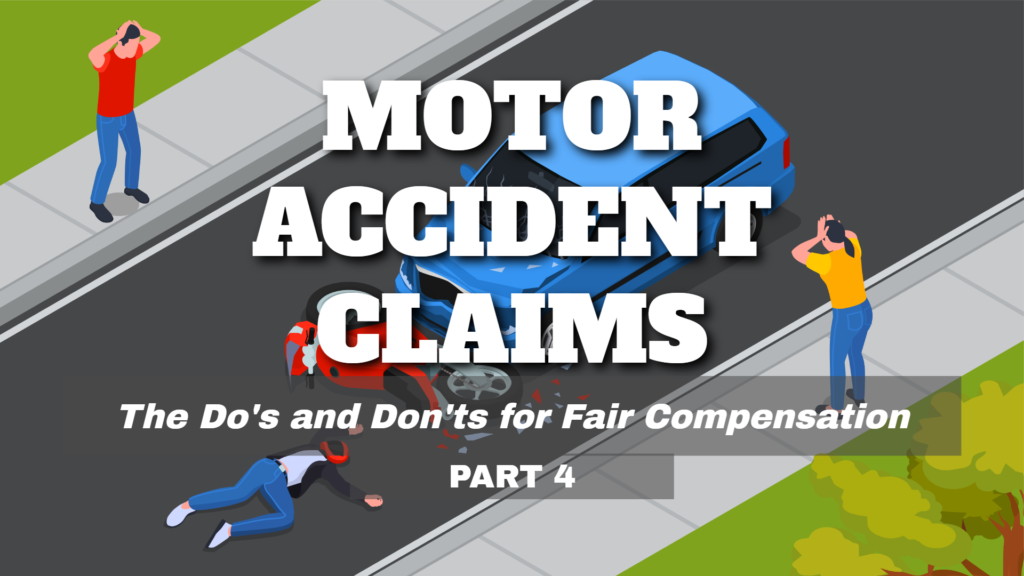Introduction
Motor vehicle accidents can be life-altering events, leaving behind physical injuries, emotional distress, and financial burdens. When faced with the aftermath of a collision, seeking compensation for damages and injuries through a Motor Accident Claim Petition (MACP) can be overwhelming. However, being well-prepared and aware of the dos and don’ts during the process can significantly improve the outcome of your claim.
The article will guide you through the essential steps and precautions to ensure a smoother MACP process and empower you to seek just and adequate compensation. Here are some Do’s and Don’ts that will guide you to file a successful MACP.
What to Do?
1. Report the Accident:
The first and most crucial step after an accident is to report it to the relevant authorities, such as the police department. File a First Information Report (FIR) and request a copy of it, as it serves as valuable evidence for your claim.
2. Seek Medical Attention:
Your health and safety should be the top priority. Seek immediate medical attention for yourself and any other parties involved, even if the injuries seem minor. Timely medical evaluation will help establish a direct link between the accident and the injuries sustained.
3. Notify Your Insurance Company:
Contact your insurance company as soon as possible to report the accident and initiate the claims process. Provide accurate details about the accident and cooperate fully with their investigation. This step allows the insurance company to initiate proceedings for settlement under Section 149 of the Motor Vehicles Act, 1988.
4. Gather Documentation:
Collect all relevant documentation related to the accident, such as the police report, medical records, photographs, witness statements, insurance documents, repair estimates, and any additional evidence supporting your claim. Keeping a comprehensive record will strengthen your case.
5. Consult with a Lawyer:
Seek legal representation from a lawyer experienced in handling motor accident claims. A skilled attorney will guide you through the process, ensure you receive fair compensation for your injuries and damages, and protect your rights.
6. Negotiate and Settlement:
Carefully review any settlement offers proposed by the insurance company. Consult with your attorney to evaluate the offer and negotiate for a fair settlement. Consider factors such as medical expenses, property damage, loss of income, pain and suffering, and long-term effects of the accident before making a decision and entering a settlement.
7. File a Motor Accident Claim Petition:
If a fair settlement cannot be reached through negotiation, file a Motor Accident Claim Petition (MACP) with the appropriate Tribunal. Ensure to include all necessary supporting documents and adhere to the prescribed timelines, which is typically within six months from the date of the accident.
What NOT to Do?
1. Do Not Delay Notifying The Accident To The Police:
Delaying the filing of an FIR can adversely affect your claim. It is mandatory to file an FIR, as the police report filed under Section 159 of the MV Act 1988 serves as a crucial piece of evidence before the tribunal. Missing this claim filing could result in the tribunal treating the police report under Section 159 as your Motor Accident Claim Petition (MACP) under Section 166(4) of the MV Act 1988.
2. Do Not Delay Seeking Medical Attention:
Promptly seek medical attention for any injuries sustained in the accident. Delaying medical evaluation can weaken your claim and hinder the establishment of a direct link between the accident and your injuries.
3. Do Not Sign Settlement Offers Without Legal Advice:
Avoid signing settlement offers without consulting your lawyer. Early settlement amounts may be lower than what you are entitled to, and legal advice ensures you receive fair compensation.
4. Do Not Record Statement Without Legal Advice:
Be cautious about providing statements to insurance companies, police, or the other parties involved without the guidance of your lawyer. Avoid making statements admitting fault, as the investigation and legal process should determine liability.
5. Do Not Ignore Time Limits:
Follow the time limit of six months from the accident date as set forth in Section 166(3) of the Motor Vehicles Act, 1988, for filing your MACP. Missing this limitation period may result in your claim being time-barred, and you may lose the right to seek compensation.
6. Do Not Hide or Alter Evidence:
Never conceal or alter any evidence related to the accident or injuries. Such actions can seriously harm your credibility and adversely affect the outcome of your claim petition.
7. Do Not Navigate the Process Alone:
Engage the services of a qualified personal injury lawyer who specializes in motor accident claims. Navigating the legal process alone can be overwhelming and may jeopardize your chances of a successful claim.
Conclusion
Each motor accident claim is unique, and the specific dos and don’ts may vary based on the facts and circumstances of the accident. However, being well-informed about the essential steps and precautions can significantly impact the outcome of your claim. By promptly reporting the accident, seeking medical attention, notifying your insurance company, gathering comprehensive documentation, consulting with a lawyer, and adhering to the dos and don’ts, you can empower yourself to seek fair compensation and a successful recovery. Remember, legal representation is crucial during this process, as it ensures your rights are protected and your claim is handled diligently.
You may like to read :
